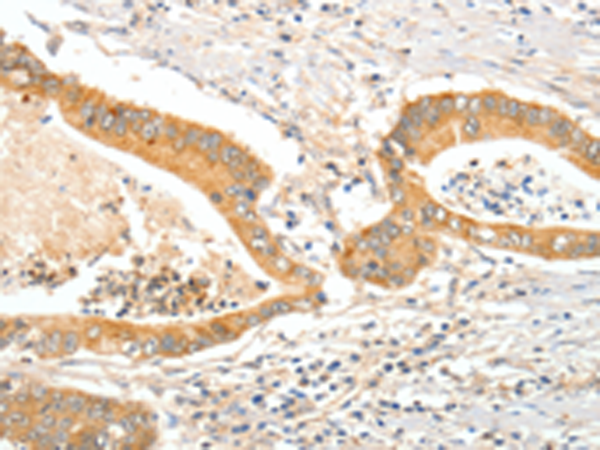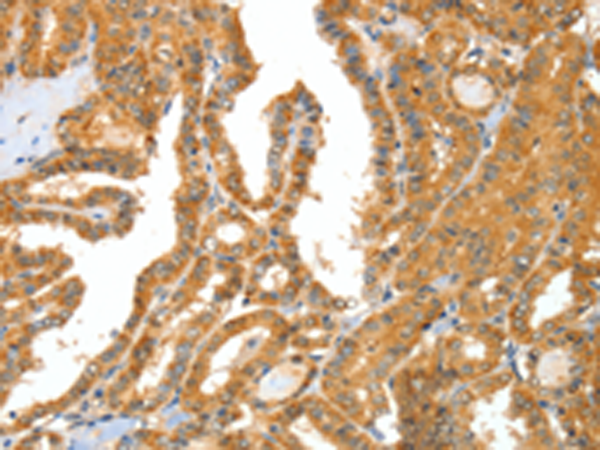

| WB | 咨询技术 | Human,Mouse,Rat |
| IF | 咨询技术 | Human,Mouse,Rat |
| IHC | 1/15-1/50 | Human,Mouse,Rat |
| ICC | 技术咨询 | Human,Mouse,Rat |
| FCM | 咨询技术 | Human,Mouse,Rat |
| Elisa | 1/1000-1/5000 | Human,Mouse,Rat |
| Aliases | FLDB; LDLCQ4 |
| Host/Isotype | Rabbit IgG |
| Antibody Type | Primary antibody |
| Storage | Store at 4°C short term. Aliquot and store at -20°C long term. Avoid freeze/thaw cycles. |
| Species Reactivity | Human, Mouse, Rat |
| Immunogen | Synthetic peptide of human APOB |
| Formulation | Purified antibody in PBS with 0.05% sodium azide and 50% glycerol. |
+ +
以下是关于APOB抗体的3篇代表性文献摘要,供参考:
---
1. **文献名称**:*Autoantibodies to oxidized low-density lipoprotein in patients with coronary artery disease*
**作者**:Tsimikas S, et al.
**摘要**:该研究发现冠心病患者血浆中抗氧化型低密度脂蛋白(oxLDL)的自身抗体水平升高,其中APOB是oxLDL的主要靶抗原。这些抗体可能通过调控炎症反应参与动脉粥样硬化进程,并与心血管事件风险相关。
---
2. **文献名称**:*The role of adaptive immunity in atherosclerosis*
**作者**:Binder CJ, et al.
**摘要**:研究探讨了针对APOB-100的天然IgM抗体在动脉粥样硬化中的作用,发现其通过与氧化磷脂表位结合抑制血管炎症反应,提示APOB抗体可能具有抗动脉粥样硬化的保护性功能。
---
3. **文献名称**:*Autoantibodies against apolipoprotein B-100 in patients with systemic lupus erythematosus*
**作者**:Rho YH, et al.
**摘要**:该研究在系统性红斑狼疮(SLE)患者中检测到高水平的抗APOB-100自身抗体,并发现其与疾病活动性及动脉粥样硬化标志物正相关,提示APOB抗体可能作为SLE患者心血管并发症的生物标志物。
---
**备注**:以上文献为领域内经典研究,具体引用时建议通过PubMed或Google Scholar核对完整信息(年份、期刊等)。若需实验技术类文献,可补充抗APOB抗体在检测方法(如ELISA)中的应用研究。
**Background of APOB Antibodies**
Apolipoprotein B (APOB) is a critical protein component of lipid transport systems, primarily found in low-density lipiproteins (LDL) and very-low-density lipoproteins (VLDL). It exists in two major forms: APOB-100. synthesized in the liver and integral to VLDL and LDL structure, and APOB-48. produced in the intestine for chylomicron assembly. APOB plays a central role in lipid metabolism by mediating the binding of lipoproteins to cellular receptors, facilitating cholesterol delivery to tissues.
Antibodies targeting APOB are widely used in research and diagnostics to study lipoprotein metabolism, cardiovascular diseases (CVD), and metabolic disorders. Elevated levels of APOB-containing lipoproteins are strongly linked to atherosclerosis, making APOB a key biomarker for assessing CVD risk. APOB antibodies enable quantification of APOB in serum, aiding in the evaluation of dyslipidemias and the effectiveness of lipid-lowering therapies.
Additionally, autoimmune responses to APOB have been explored in conditions like systemic lupus erythematosus (SLE), where anti-APOB antibodies may correlate with disease activity. Recent studies also investigate their role in modulating inflammation and endothelial dysfunction. As tools, APOB antibodies are essential for immunoassays, Western blotting, and immunohistochemistry, contributing to both basic science and clinical applications in cardiometabolic health.
×